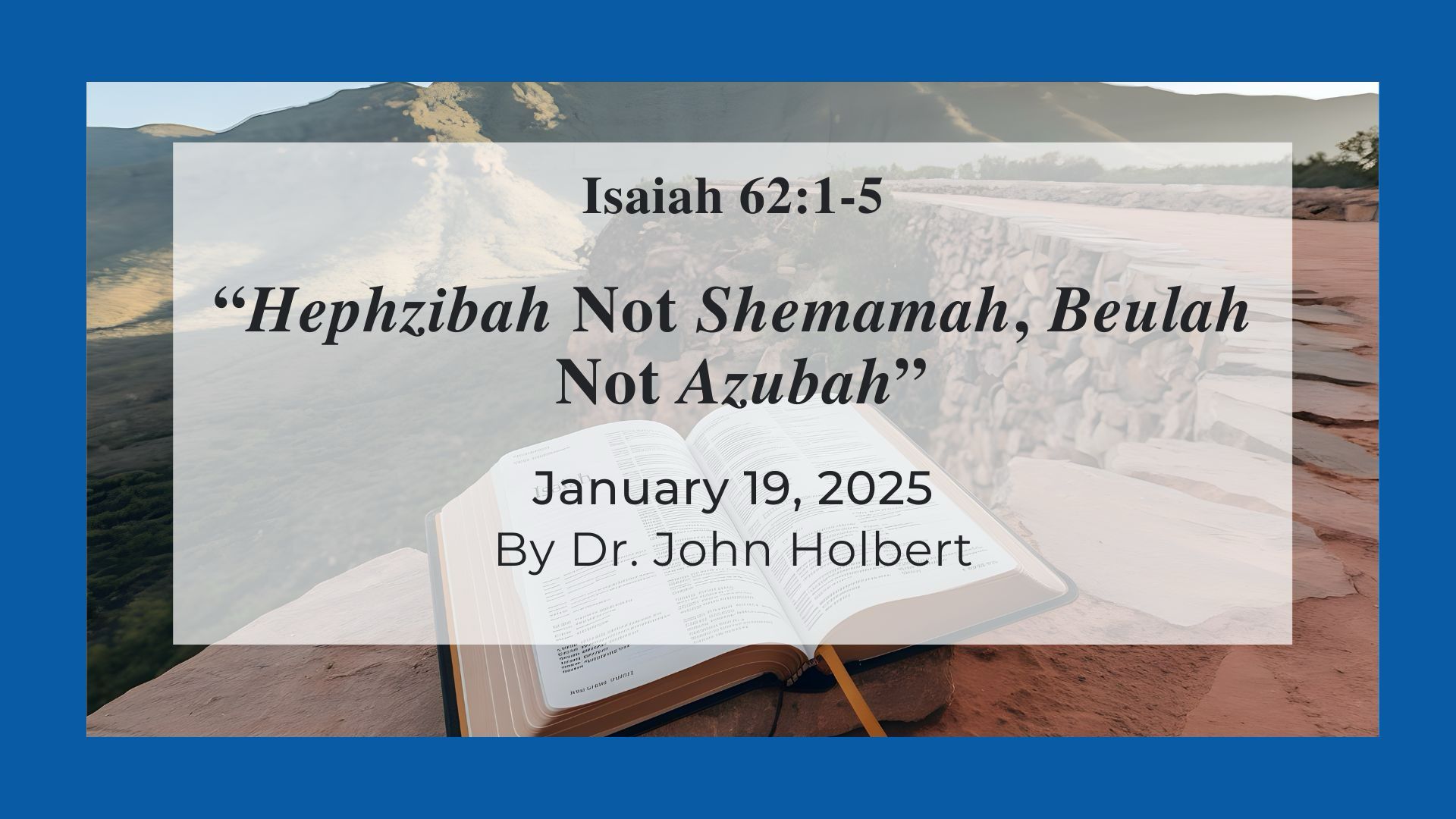Hephzibah Not Shemamah, Beulah Not Azubah - Reflections on Isaiah 62:1-5, Epiphany 2, Year C
by John Holbert on Thursday, December 26, 2024

I have been a singer nearly all of my life, and though I was trained classically to sing opera, oratorio, and art song, I have along the way regularly listened to other sorts of music, not pop, rock, or hip-hop and their derivatives, but gospel music has been a sort of guilty pleasure. I well recognize the often dreadful theology that these songs espouse, spending an inordinate amount of musical time longing for heaven, desiring closer walks with Jesus, stepping into gardens or mansions alone, wishing for a sweet Jesus to wing them to the skies bye and bye. I suppose I like the harmonies and the voices, the wonderfully high tenors and the impossibly low basses. Since I am now a bass in my advanced age, I long for the days when I can sound those low E’s without effort; you singers out there know well what I mean.
One of the more famous of the gospel tunes has to do with “Beulah Land.” There are many more than a few songs that announce that wonderful place, a place that these songs claim is simply another name for heaven. Of course, in Isaiah 62:4, the origin of a land called Beulah has precisely nothing to do with heaven! One of the prophets that make up the complex book of Isaiah (3-Isaiah) is in fact referring to what my NRSV text heading calls “The Vindication and Salvation of Zion.” The text was obviously written sometime after the exile of Israel when the armies of Babylon decimated the city of Jerusalem and hauled its king, his court, his wise ones, his priests off to Babylon to exile. The fateful year was 587BCE, one of the important dates in Israelite/Judean history.
Babylonian exile was not a slave existence, but it was a conquered life, a life lived on the fringes of Babylonian society. It meant being surrounded by Babylonian language, culture, religion and its regular rounds of festivals. Exile in Babylon lasted about two generations, meaning that many from the Judean community were born in Babylon, so that the stories of Jerusalem and its long line of Davidic kings, its history of priestly activity in the glorious temple, and the wonders of the land promised and given by YHWH, meant little, less and less as the exilic years passed.
When Cyrus absorbed the Babylonian empire into his larger Persian one, beginning in 539BCE, some of these Judeans accepted the new ruler’s amazing offer of return to their homeland, eagerly heading west, buoyed by Persian blessing and Persian coin. But not all. Many Judeans remained in Babylon, forming there a vibrant Jewish community that birthed many significant Jewish documents that still today serve Jewish communities around the world. In addition, prophets like 3-Isaiah kept the hopes of a renewed Jewishness alive with their rich poetry, claiming that a renewed Jerusalem, and hence a renewed Israelite homeland, was still possible; indeed it was certain in the power of YHWH. Is.62 offers one such poetic announcement of the glories of a new Jerusalem.
“For the sake of Zion (i.e. Jerusalem), I will not stay silent;
for the sake of Jerusalem, I will never rest
Until its righteousness (vindication?) comes,
its salvation like a flaming torch.”
3-Isaiah promises never to allow the wonders of Jerusalem to be forgotten, and will continually speak energetically about it with the exiles or with those who imagine that the city’s days are over. No, says Isaiah! Its “righteousness” or its “vindication” (the word used means both) will be seen again, and it will be made whole, or “saved” in the more traditional language. Not only will its renewed population see righteousness and salvation, but so shall “nations and kings” (Is.62:2). In fact, new names will be given to the city, as the city “rests in the hand of YHWH” as both a “crown of beauty” and a “royal diadem” (Is.62:3).
And here are the new names: no longer will the city be called “Abandoned” (azubah), nor the land named “Desolate” (shemamah), but now the name for the city will be “My delight is in it” (chephzi-bah), and the land “married” (beulah) (Is.62:4). Those who return to the land of Israel, whenever that return may be, will find there a land called “married,” for in the same way that a groom rejoices over his bride, so will YHWH rejoice over Israel (Is. 62:5). Despite the gospel song, beulah land is not heaven, but is rather a land of Israel redeemed and saved by YHWH, who rejoices over the divine work as if married to it. I suppose it might be said that the trip from a joyous “beulah land” on earth may not be so far from a joyous “beulah land” in heaven, if one is into those sorts of theological notions, though the ancient prophet would surely not understand at all what the song claims to say. Nevertheless, I intend to go on enjoying the song anyway!
